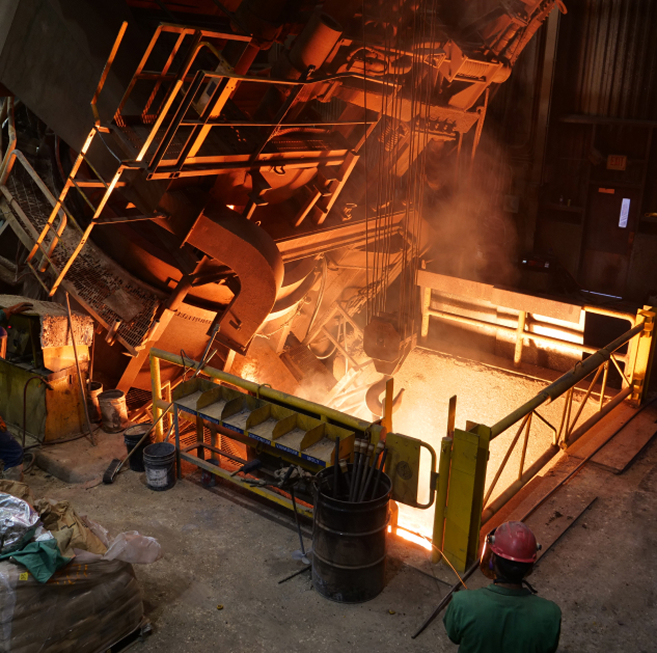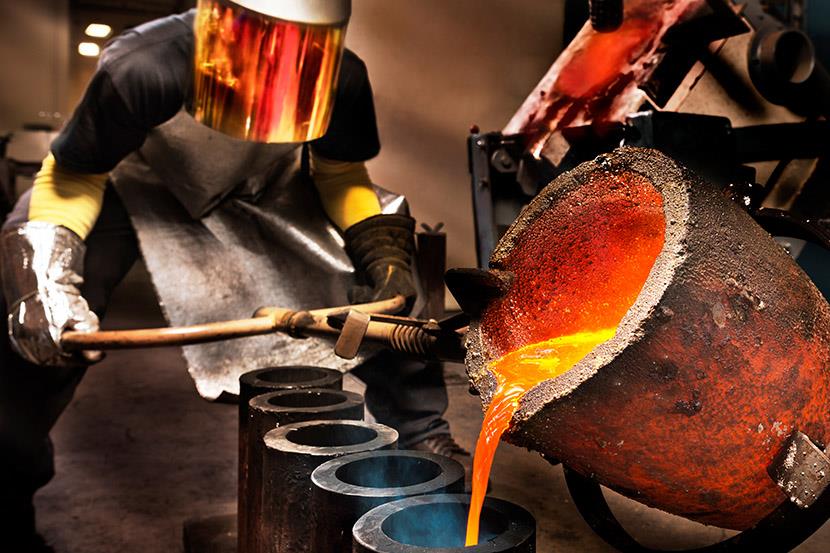Just How a Metal Foundry Adds to Sustainable Metal Production Practices
Metal foundries play an important duty in advertising sustainability within the metal production industry. By incorporating recycled materials, they decrease reliance on virgin sources and minimize ecological impacts. Energy-efficient melting processes even more lessen power usage and exhausts. The journey toward lasting methods involves more than simply reusing and energy administration. It incorporates a more comprehensive dedication to moral sourcing and cutting-edge technologies. The implications of these practices are significant and warrant closer examination.
The Role of Recycling in Metal Foundries
While metal production has actually generally relied upon virgin products, the increasing focus on sustainability has actually resulted in a significant change in methods, specifically in metal foundries. Recycling has actually become a crucial element of this improvement, permitting foundries to repurpose scrap metal and decrease dependence on mined resources. By integrating recycled products right into their processes, foundries not just reduce environmental impact but also lower production prices.
Making use of recycled metals, such as steel, aluminum, and copper, decreases energy intake and decreases greenhouse gas discharges linked with traditional mining and refining methods. Foundries can accomplish high-grade results by utilizing innovative sorting and handling technologies to assure the purity of recycled products. This emphasis on recycling fosters a round economic climate, where waste is minimized, and resources are utilized effectively. Metal foundries play a critical function in advertising lasting practices within the metal manufacturing sector.
Energy-Efficient Melting Techniques
Energy-efficient melting methods are important for boosting sustainability in metal production. These techniques significantly decrease energy usage throughout the melting procedure, which is one of the most energy-intensive stages in metal manufacturing. Technologies such as induction melting, resistance heating, and microwave melting offer enhanced effectiveness contrasted to traditional methods. Induction melting, as an example, uses electro-magnetic fields to produce warm straight within the metal, decreasing energy loss and providing accurate temperature control.
Additionally, executing warm healing systems can additionally improve effectiveness by capturing and reusing waste heat generated during melting. Employing advanced insulation materials and enhancing heating system styles also add to energy savings. By embracing these innovative melting techniques, metal foundries can lower their carbon footprint, lower functional prices, and add to a much more sustainable manufacturing landscape. The integration of energy-efficient practices not just straightens with environmental goals but additionally meets the growing need for accountable production methods in the metal sector.
Lasting Sourcing of Raw Materials
Sustainable sourcing of raw materials is important for decreasing the environmental effect of metal manufacturing. This entails the raised utilization of recycled metals, the adoption of ethical mining practices, and initiatives focused on neighborhood sourcing. By prioritizing these methods, the market can promote accountable resource monitoring and assistance local economic situations.

Recycled Metal Application
How can markets properly decrease their ecological influence while meeting the growing need for metal? One considerable technique is the utilization of recycled metal. By incorporating scrap metal into their manufacturing procedures, foundries can lower the removal of virgin materials, thereby lowering and conserving natural resources energy consumption. Recycled metals require much less energy to process contrasted to their raw equivalents, bring about reduced greenhouse gas exhausts. Furthermore, the use of recycled metal aids draw away waste from landfills, promoting a circular economic climate. Industries that prioritize recycled metal not only add to sustainability yet additionally benefit from price financial savings related to reduced material procurement. Consequently, recycled metal utilization stands as a necessary technique for ecologically accountable metal production.
Ethical Mining Practices
While the demand for steels proceeds to climb, sectors are progressively acknowledging the significance of honest mining techniques in ensuring liable sourcing of basic materials. Honest mining encompasses a commitment to ecological stewardship, social obligation, and adherence to fair labor practices. Companies are currently focusing on partnerships with mines that demonstrate openness in their operations, reducing eco-friendly impact and appreciating local neighborhoods. This method not only promotes a sustainable supply chain yet also improves the track record of organizations entailed. By carrying out strenuous criteria and qualifications, sectors can battle prohibited mining activities and promote the welfare of employees. Ultimately, moral mining methods add considerably to an extra sustainable metal manufacturing environment, straightening economic development with environmental and social integrity.
Local Sourcing Initiatives

Technologies in Metal Casting Procedures
Advancements in metal casting processes are transforming the sector by including sophisticated recycling methods that minimize waste. Energy-efficient melting techniques are also being developed to lower power consumption throughout manufacturing. Furthermore, making use of cutting-edge mold and mildew products adds to enhanced efficiency and sustainability in casting operations.
Advanced Recycling Techniques
Advanced recycling strategies are transforming metal casting processes, greatly boosting sustainability in the market. These developments focus on redeeming and reprocessing scrap metal, considerably lowering waste and the requirement for virgin materials. Methods such as hydrometallurgy and pyrometallurgy enable foundries to extract valuable steels from used elements, ensuring efficient resource utilization. Additionally, advanced sorting and filtration technologies boost the quality of recycled metals, linked here making them ideal for high-performance applications. This not only decreases the ecological footprint of metal production yet also promotes a round economic climate by advertising the reuse of materials. As these reusing methods remain to advance, they promise to additionally streamline operations within foundries and add to a more sustainable metal manufacturing landscape.
Energy-Efficient Melting Approaches
While conventional melting techniques have actually long been the foundation of metal casting, recent improvements have actually introduced energy-efficient methods that considerably reduce energy consumption and discharges. Technologies such as induction melting and electric arc heating systems have acquired prestige, enabling exact control over temperature level and decreasing the requirement for fossil gas. These approaches not just boost energy effectiveness yet likewise advertise quicker melting times, which converts to reduce operational prices. Additionally, innovations in heat recovery systems enable foundries to capture and reuse excess heat generated during the melting process. This alternative strategy to power monitoring not just sustains sustainable methods however also positions metal foundries as leaders in the shift in the direction of greener manufacturing processes, even more aligning with global sustainability goals.
Cutting-edge Mold Products
As the need for even more visit site effective and sustainable metal casting processes expands, the expedition of ingenious mold materials has ended up being a centerpiece in the industry. Conventional mold products usually add to environmental challenges, prompting the search for choices that minimize waste and energy intake. Current improvements include the growth of recyclable composites and biodegradable binders, which not only boost mold performance yet likewise minimize eco-friendly effect. Furthermore, using 3D printing modern technology in mold and mildew development allows for complex styles that minimize material usage and allow quick prototyping. These innovative products not just improve casting accuracy however additionally align with sustainability goals, showcasing the market's dedication to reducing its carbon footprint while keeping top notch production standards.
Lowering Waste Through Advanced Innovation
Ingenious innovations are changing the metal manufacturing industry by significantly decreasing waste and boosting performance. Advanced information analytics and artificial intelligence formulas make it possible for foundries to optimize production processes, determining inadequacies and decreasing scrap product. Smart sensing units check tools efficiency in real-time, permitting for predictive maintenance that lowers downtime and waste generation. Additionally, additive production strategies, such as 3D printing, permit the creation of facility elements with minimal product usage, considerably decreasing waste contrasted to traditional techniques.
Closed-loop systems are coming to be much more prevalent, in which scrap metal and by-products are recycled back right into the production cycle, making certain that materials are utilized to their greatest capacity. This integration of innovation not only promotes source conservation yet likewise improves the overall sustainability of metal manufacturing practices. By welcoming these developments, foundries can add to a much more lasting future while preserving competition in the market
The Influence of Foundries on Carbon Footprint Decrease
Foundries play an important duty in decreasing the carbon impact of the metal production market by executing numerous lasting techniques. By using energy-efficient modern technologies, such as electric arc furnaces, these centers significantly reduced greenhouse gas emissions contrasted to traditional approaches. Furthermore, foundries increasingly take on renewable resource resources, which also reduces their reliance on fossil fuels.
Reusing scrap metal is another essential method that foundries employ, saving sources and lowering the need for virgin materials. This not only lessens waste but likewise reduces the energy-intensive extraction procedures related to mining. Additionally, the adoption of closed-loop water supply aids to reduce water usage and minimize wastewater discharge, adding to a much more lasting procedure.
With these campaigns, foundries show their dedication to ecological stewardship, bring content about a significant decrease in the general carbon impact of the metal production industry. Their recurring initiatives are essential in the shift towards an extra lasting industrial landscape.
Frequently Asked Concerns
What Sorts of Metals Are Many Frequently Recycled in Foundries?
Aluminum, brass, steel, and copper are amongst one of the most typically recycled metals in foundries. These steels are preferred due to their high recycling rates, financial value, and widespread availability, contributing greatly to commercial sustainability initiatives.
Just How Do Foundries Make Sure the Quality of Recycled Materials?
Foundries ascertain the high quality of recycled products with strenuous testing, arranging, and purification processes. They apply sophisticated innovations to analyze composition and remove impurities, guaranteeing that the recycled steels meet sector requirements for efficiency and security.
What Certifications Exist for Lasting Foundry Practices?
Numerous accreditations exist for sustainable foundry methods, including ISO 14001 for environmental monitoring, ISO 50001 for energy management, and LEED qualification for lasting building techniques (Aluminum Casting). These qualifications help ensure adherence to ecological and sustainability requirements in procedures
How Do Foundries Determine Their Carbon Impact Reduction?
Foundries determine carbon impact reduction through devices like lifecycle analyses, energy audits, and discharges tracking systems. They contrast baseline discharges to existing outputs, reviewing renovations in energy efficiency, material usage, and renewable power fostering with time.
What Are the Financial Advantages of Lasting Metal Manufacturing?
Sustainable metal manufacturing uses financial benefits such as reduced operational costs, enhanced effectiveness, boosted market competitiveness, and prospective government rewards. In addition, it fosters development and draws in ecologically aware customers, inevitably driving long-term success for organizations.
Metal foundries play an essential duty in promoting sustainability within the metal production industry. While metal manufacturing has actually commonly relied on virgin products, the raising emphasis on sustainability has led to a significant shift in techniques, specifically in metal foundries. By integrating scrap metal right into their manufacturing procedures, foundries can lower the removal of virgin products, consequently decreasing and conserving all-natural resources energy consumption. Foundries play a vital function in reducing the carbon impact of the metal manufacturing market by executing various sustainable techniques. Recycling scrap metal is another crucial practice that foundries use, saving resources and reducing the demand for virgin products.